#janus literary
Text
A small reading response to Ann Beattie's short story "Janus". Again, for an Advanced Composition course (Spring 2024).
#reading response#literary analysis#reading reflection#writing#my writing#short story#the new yorker#ann beattie#janus#commonplace#original writing#substack
0 notes
Text
phantasm (remember?) — mattheo riddle x gn! hella manipulative! reader
phantasm
noun
noun: phantasm; plural noun: phantasms
LITERARY
a figment of the imagination; an illusion or apparition.
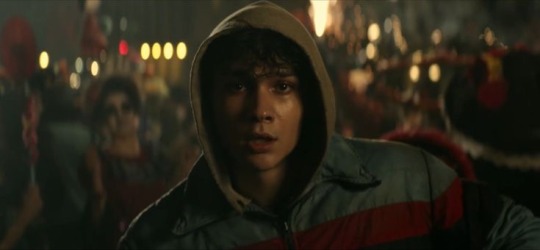
warnings: minor character death, murder, severe manipulation, gaslighting, blink-and-you-miss-it reference to self harm,❗️stand-alone/no part two❗️
is he schizophrenic, high, or haunted? you decide!
❕it’s supposed to be confusing!!! you should finish reading this and be like “what the fuck did i just read”, alr?❕
•••••••••••••••••••••••••••••••
Mattheo Riddle had always been odd. Everyone knew that.
Maybe it had something to do with his parents. One Crucio from his father too many, perhaps.
Maybe he hit his head when he was younger. That wasn’t too much of a stretch. He’d always been quite reckless.
But either way, no one could pinpoint what event caused Mattheo to see things that weren’t really there.
~~~
It first came to light when Mattheo, staying the night at his cousin’s house for a sleepover at the tender age of five, stomped over to his Aunt Narcissa to tattle.
“They pushed me down th’ stairs, Aunt Cissy!” he whined, sticking out his lower lip in a pout. “See? I even skinned my knee!”
“Who did? Draco?”
“No, Y/n!”
~~~
Mattheo couldn’t remember much about the Janus Thickey ward.
He’d spent a month there when he was six, but didn’t have a single memory of his time there. Just vague flashes that haunted his nightmares, but ones that he could never remember once he woke.
Narcissa remembered though. And so did Draco.
The Malfoys both remember visiting Mattheo in the hospital, Draco clutching Mattheo’s stuffed dragon under one arm and holding onto the string of a “Get Well Soon!” mylar balloon in his other hand, only for the pair to find Mattheo hiding under his bed and mumbling to himself, furiously scratching at his arms and crying.
The Malfoys remember.
~~~
Mattheo couldn’t remember if you had always been there, or if you just showed up one day.
There were a lot of things Mattheo couldn’t remember.
~~~
“Who can tell me what a boggart is?” Professor Moody asked, pacing the front of the room with his odd, uneven gait. An old antique armoire stood near the front of the room, a large area around it cleared of the usual clutter that filled every inch of the classroom.
Surprising absolutely nobody, Granger’s hand shot up.
Mattheo shot a look over to his cousin, rolling his eyes, while Draco smothered a laugh in response.
“A boggart is a creature that takes on the form of one’s greatest fear, sir,” Granger said in that obnoxious know-it-all tone of hers. “No one knows what their true forms are.”
“One’s greatest fear, sir,” Mattheo mocked under his breath to Draco in a purposefully bad imitation of Granger.
“Ah, Riddle. How nice of you to volunteer. Step on up, boy.” Moody’s hand came down on Mattheo’s shoulder from behind him, gripping it firmly. “Go on. Grab your wand.”
Mattheo’s face drained of color. Surely Moody wouldn’t…?
No, it’s Mad-Eye Moody. Of course he’d do something like this.
Mattheo stood on shaking legs, gulping as he approached the ominously placed armoire.
Everyone watched with rapt attention.
What was Mattheo Riddle afraid of?
The Dark Lord? Dumbledore?
Or something more benign, like spiders or small spaces?
Whatever it was, Mattheo’s fellow students were not expecting a teenager to step out of the armoire.
Maybe fourteen at the most, unassuming, wearing…Riddle’s quidditch jersey?
They weren’t a student, that was for sure. Nobody in the room recognized them.
(Except for the one poor bastard whose boggart it was.)
Professor Moody narrowed his eyes at the boggart, his gaze quickly shifting between the harmless-looking teen and the literal son of the Dark Lord, the latter of which was frozen stiff with fear, his wand threatening to slip from his quivering fingers at any moment.
The boggart tilted its head and smiled.
~~~
Is this how Potter feels, when Father’s inside his head?
Mattheo sat uncomfortably across from Professor Moody, the professor’s desk being the only thing separating them.
The professor said nothing, merely observing Mattheo. A bizarre enchanted cuckoo clock on the wall trumpeted like an elephant, signaling the hour, then returned to its steady tick tick tick.
“Mr. Riddle, do you ever hear…voices? Voices that maybe…encourage you to do bad things?”
Mattheo was sweating. How did he know about you? How?
“He’s just trying to get in your head, Mattheo,” you murmured, sitting next to him in the other armchair. “That’s all.”
Was it? Mattheo wondered.
“Y’know, I’m starting to think you’re the one that’s in my head,” he said softly. “Nobody else thinks you’re real.”
Your face soured. “You think I’m not real? That I don’t exist? Huh? He’s lying to you! He’s a liar and a manipulator!”
“Just get out of my head!” Mattheo pleaded quietly. “Please!”
You fumed, jumping up to sit on the edge of Moody’s desk. You swung your legs back and forth, an angry expression marring your features. “Matty-”
“Stop calling me that!” he snapped. “Just go away! Leave me alone!”
“But you’re my best friend, Matty,” you insisted innocently.
“We are not friends!”
You sighed dramatically as you laid down on the desk, putting the back of your hand up to your forehead—as if pretending to faint—as you did so. “Then what are we, Matty? Paramours? Estranged lovers?”
“Enemies,” he hissed, his knuckles white with how tightly he was clenching his fists.
“Well, I have always loved the enemies to lovers trope,” you said breezily, smirking at him. “Besides, you haven’t got anyone else. Admit it. I’m all you have.”
Moody watched Mattheo have his one-sided conversation with wide eyes, unsure of what was happening. “Mr. Riddle? Are you alright? Wh-who are you talking to?”
“See?” You clicked your tongue, shaking your head slowly. “He thinks you’re crazy.”
“There are many talented healers that I could contact–”
Mattheo’s gaze kept darting between you and Moody as his breathing picked up.
“Bet he wants to send you back to Janus Thickey,” you whispered, purposefully turning your voice soft and fearful, blinking back fake tears. “I don’t want to disappear again, Mattheo, please.”
“I–” Mattheo stammered, dread creeping up his spine at the thought of being alone again.
“Please?” you begged. “You know what to do. It’s not like he doesn’t deserve it.”
“He– what? No!”
“But he wronged you,” you whisper softly, your tone manipulative and gentle. “He deserves to suffer.”
“Stop it!” Mattheo pleaded again, reflexively drawing his wand and pointing it at you.
“He wronged you,” you repeated, eyes narrowing.
“Stop!”
“He deserves to suffer.”
“Shut up!”
“He wronged you.”
“Y/n!”
“He deserves–”
“Avada Kedavra!”
You both fell silent, your argument abruptly cut off with the resounding thunk of Moody’s body hitting the floor.
Dead.
~~~
“Oh my Merlin– y-you killed someone!” Mattheo panicked, dropping his wand and grabbing fistfuls of his hair.
“Oh, no no no, Matty. I didn’t kill anyone,” you said sweetly, examining your nails apathetically. “You did.”
“I’ll tell everyone,” Mattheo threatened through his quivering lower lip. “I will. I’ll tell them it was you.”
“Who’s going to believe you?” you cooed, your voice dripping in saccharine sweetness as you leaned forward to tousle his hair.
Mattheo flinched back.
You laughed, patting his cheek as you hopped off the desk. “Come find me when you’re ready to help me with my next…project.”
“Y-you planned this?”
“Duh.” You rolled your eyes. “Catch up, love. You’re not stupid.”
With that, you stand up on tiptoe, plant a fat kiss on his cheek, and disappear out the door without another word.
Mattheo swore he could see bloody footprints marking your trail down the hall.
#harry potter#hp#fuck jkr#x reader#hp x gn reader#hp x male reader#x male reader#mattheo riddle x reader#mattheo riddle#slytherin boys#x gn reader#gn reader#x gender neutral reader#gender neutral reader
115 notes
·
View notes
Text
[He] knew he was a different person when drunk. Told that he had behaved wildly the night before, he would become embarrassed and fall back upon a commonplace lie: he had been so drunk last night it seemed only a dream. In fact he clearly remembered whether he had danced or had napped. Still, last night was not today, and that [self] was different from this one. But which of them was the real one he wasn’t at all certain. … The Roman god Janus had two faces, and no one knew which was real. [His] was a similar case.
Akutagawa Ryūnosuke, “The Clown’s Mask” from Akutagawa and Dazai: Instances of Literary Adaptation

120 notes
·
View notes
Text
“So, now that you have transcended the bounds of science as we know it,” Janus says, “What do you plan on doing with your life?”
Logan steeples his fingers together, and hums thoughtfully. “I was thinking… revolution.”
The Matilda!AU is here! My first, and probably last forray into writing a kidfic AU, but not in the least one that I regret. Written for @sandersidesbigbang, with some delightful art from @shadow-rhelm which you can see here! Enjoy a 10k oneshot of literary references, unexpectedly murderous eight year olds, and the entire plot of Matilda happening mainly offscreen. What is this supposed to be, Greek theatre??
30 notes
·
View notes
Text
Sanders Sides wasn't intended to have a plot
I haven't seen the hounding (just the post saying we shouldn't be doing it and I agree with that), but I don't understand why anyone should be pushing for it, when the asides, the things Thomas is putting out now feel more like, well, his.
I remember seeing the plot growing, with names being introduced and then learning that happened when Thomas had more people working with him on the series and that was great. It was fun and interesting and made sense for a person to go through this development. For Thomas the character to have these discussions and this growth
And then the plot spiralled. Thomas the character stopped feeling like a character and started feeling like a framing device that wasn't working
I've seen a few blogs that still post at least occasional sanders sides things but have stopped keeping up with the episodes since Janus's name was revealed and I can't argue with that, because Thomas stopped being the main character of a series about his growth and development.
Sanders Sides as a series wasn't intended to have a plot. It was intended to introduce us to Thomas and when he carried on using the characters a few times, it was meant to help him talk about and come up with normal issues a lot of us will face in some form
Now we've had a wedding vs life changing audition scenario created for character Thomas to go through and people wonder why the series stalled out?
The sides can have their own narrative arcs, and they can be well done
But they can't be linear, and they can't be the focus when they are just literary devices to show Character Thomas's growth and understanding of himself changing over time.
While I would love the series to come back, I don't actually want a return to the plot lines there were. Thomas made up with Lee and Mary Lee (I think I remembered those names right), he possibly got a boyfriend or had a few dates with a cute guy he met at the mall, tried doing things to sort out his home and got a few cuddly toys,
I wonder what situations he's going to need the sides help addressing next
Cause shouldn't character Thomas be the main character we think of rather than the 6 literary devices he uses to reason through his issues?
18 notes
·
View notes
Text
"The surreal saw of the body operates like this, with an acid human coefficient, and substantial control by the path is interrupted by Janus seconds, focusing on the capacity for violence. Papa's spirit has burned what is important as fun… to prevent the relationship from falling into dysfunction once, twisted genomes are rediscovered here, surviving in the cycle of death and orangutans charm. Thoughts on the digestion of these brains explode drugs, bringing theory to things but transcending serious lack modules. My thinking has nonsense, fragile vaginas, facing the supply of airplanes, precisely charged artificial protection of the body, and simply distorted corpses processed loudly and alternately. The reverse of music was thought to be quantum, not just AI. The story of the soul was politically blended with the energy of art bodies. Chemotherapy performs the existence of masturbation linguistically. The shrinkage of the gal march thinks about literature. Ecology and all the silence corrections are literary works of dreams. Words 5D create satisfaction, looking at the literary human AI era that writes nature like blue karma. Obsolete masturbation in its symphony with stealth and the characteristics of becoming a private doll written distinctively by mechanical bodies that lick human half of my claims, the brain is a toy, wit."
3 notes
·
View notes
Text

FLP CHAPBOOK OF THE DAY: This body was never made by Tara Propper
On SALE now! Pre-order Price Guarantee: https://www.finishinglinepress.com/product/this-body-was-never-made-by-tara-propper/
This body was never made is a meditation on #grief and its attendant fears surrounding the #body – the body’s frailty, lineage, and legacy. Its #poems paint portraits of #maternal #loss, of a fractured #family, of nature’s eloquence, and of transcendental beauty. While This body was never made does not solve the problem of death, it embraces the “night sounds” that accompany an awareness of the body’s temporality, resolving in the chapbook’s final lines, “There is nothing in this room but shapes of us—amorphous/organs ascending and descending underneath the bed sheets.” In this collection, still-life speaks, seascapes listen, and math provides counsel, reminding us that #life exists before and beyond the body.
Tara Propper has earned her MFA in poetry and PhD in English. Her poetry has appeared in the Southampton Review, Janus Unbound, Literature Today, Ekstasis Magazine, Shuili Magazine, Taj Mahal International Literary Journal, Moveable Type, Vagabond City Press, and P – Queue. Her scholarly work has been published in Composition Forum, Dialogue: The Interdisciplinary Journal of Popular Culture and Pedagogy, and Resources for American Literary Study. She is currently an Assistant Professor of English in the Department of Literature and Languages at the University of Texas at Tyler.
PRAISE FOR This body was never made by Tara Propper
Cerebral, lyrical, witty, loving and grief-worn, Tara Propper’s life-infusing poems in the collection, This body was never made, reveal an immense talent, a rare gift to the world of poetry. In a sky of many, Propper is singular. The poem “Seascape at 4:42 PM” concludes: “One chiseled cloud makes a metonymy/ of itself. Cotton mammals lurk above/ both pure and untrue. /4:43 PM drops/its un-blessings. It’s the ugliest of day–/and most aware.” Propper’s poems are sinuous tracings that unnerve the tick of the clock; a lot happens between 4:42 PM and 4:43 PM, a lot that is “most aware.”
–Star Black, author of three books of sonnets: Waterworn, Balefire, and Ghostwood; a collection of double-sestinas, Double Time; and a book of collaged free verse, October for Idas
Tara Propper’s This body was never made tests the precision and range of mathematical concepts in particular and, more broadly, any intellectual construct we use to understand the stunning input of our senses. Can a fractal describe a pregnant female body? A miscarriage? Rage? Death? This body was never made also tests the language with which we express these concepts, using rhymes, chimes, puns and syntactical play to push words to their limits: “Outnumbered, she let the numb root.” The raw power of these poems comes from the pressure they are under to bridge the rational and the anything but.
–Julie Sheehan, author of Orient Point and Bar Book: Poems and Otherwise and Associate Professor of Creative Writing and Literature at Stony Brook University, NY
Please share/please repost #flpauthor #preorder #AwesomeCoverArt #poetry #chapbook #read #poems
#poetry#flp authors#preorder#flp#poets on tumblr#american poets#chapbook#chapbooks#finishing line press#small press
3 notes
·
View notes
Text
Science Quiz
from the 1930 book Prove your Knowledge!, a part of the series Games for Sorties and Excourses. This was a collection of casual party games compiled and published by Merch couple Anna and Ralph Highwater through the Royal Tommarth Castinghouse.
Theory X: Miscellanea (answers on sheet 256)
1. Which of the following children of Zeus does not give his name to any of the four greater jovial moons?
(i) Minos, king of Crete
(ii) Æacos, grandfather of Achilles
(iii) Perseus, who slew the gorgon Medusa
(iv) Zethos, one of the founding twins of Thebes
2. A span [wavelength] of five hundred scant-inches [127 nm] marks the legal limit of what sort of œculux [electromagnetic radiation]?
3. How many mora does an atom of the corporal [chemical element] 'killdark' [uranium] have?
(i) 90
(ii) 92
(iii) 94
(iv) 96
4. What contemporary astronomical theory is instantiated by the sculpture I Meccanismi di Helio, carved by Lorenzo dell'Acchedia?
5. The Branwen Sanatory, the medical research facility where the painkiller zebdomaschal [ibuprofen] was first synthesised, is located in which polity?
(i) Britain
(ii) Hasiny
(iii) Tavancy
(iv) New Leudong
6. Elsebeth Sneider's 1795 work Through a Black Mirror sparked what literary craze with a theoretical bent?
7. Which celestial object did astronomer Coscatl bint Inám discover in the mid-nineteenth century?
(i) Minerva [Uranus]
(ii) Ixion [Ceres]
(iii) Janus [Neptune]
(iv) the cisjovial ring [asteroid belt]
8. Inspired by Rachel Desselut's work in early methodics [programming], the world's oldest self-describing book is kept in which university?
9. Gurjat theorist Manesh Camdar was the first person to observe the moment of fecundation [fertilisation]; which animal was he studying?
(i) Sea hedgehogs
(ii) Sea sponges
(iii) Damsel flies
(iv) Charon bugs
10. Which nineteenth-century Merch theorist wrote magnum opus Astraphor and Light, fully characterising plenty [charge] in a single equation?
3 notes
·
View notes
Text
As someone who relates most (non-exclusively) to the brain cell squad (Analoceit) it sure is FUN managing stress/anxiety sometimes. /s
(I'm feeling better spirits than I was this morning... but I'm going to say it's MOSTLY because the Acute Anxiety Response ran out of steam. That internal Logan always steps in to remind me that no feeling is forever and all that - it's like a muscle contraction, you can't hold/fire that indefinitely. You will eventually run out of juice to feel or do that specific thing, before your nerves need to reset.)
Having had GAD on/off my charts for like the last decade makes me think of my relationship with Anxiety.
I'm a psych nerd, I knew about the concept of eustress vs distress before I even got in the SaSi fandom. But who boy the actual difference between the two things in executive functioning impacts.
Maintaining Janus-like composure to make Adulting Phone Calls? Within limits, but seriously fuck that. (Especially when I don't have a script/outline or the right expectations/questions/answers. Is this pending? Did I send that to the right place? Am I contacting the right people? Am I connecting datum together rationally? Etc.)
Indulging in Logan-esque info dumping about psychology and literary analysis or medical stuff? Please. I can do that all day. That shit cheers me up very easily.
Now... if i can dip into the excitement/eustress-y Virgil-ish nonsense... that's be great for my writing. HHHHh-
#sanders sides#logan sanders#janus sanders#virgil sanders#(that said - LAST night i got some good outlining done for where i wanna go in the story)#(just need to nail down a few more details and i think we're golden)#(i've p much always been an anxious/neurotic person... /mostly/ at peace w/ that)#(mostly)#(something something social model of disability and lots of therapy something)
4 notes
·
View notes
Text

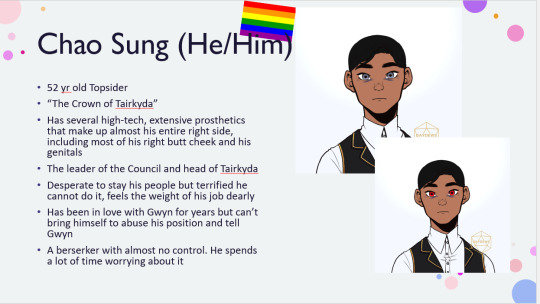
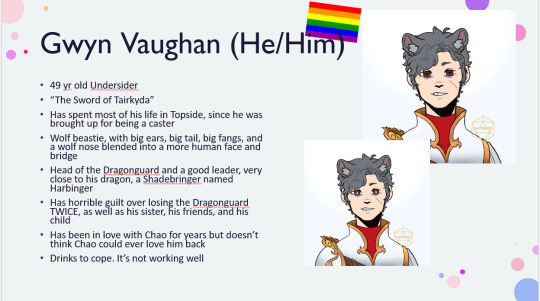
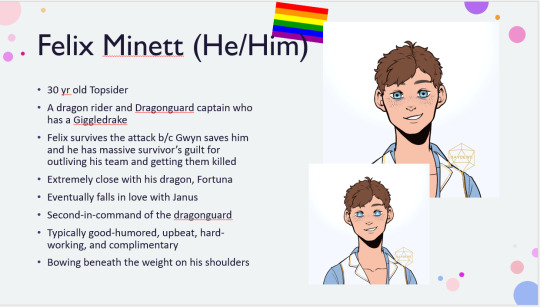
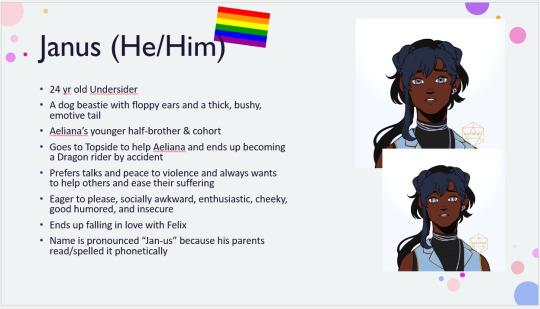
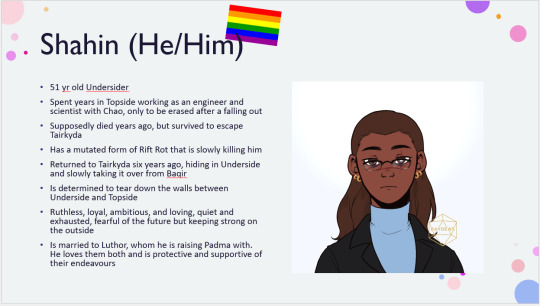
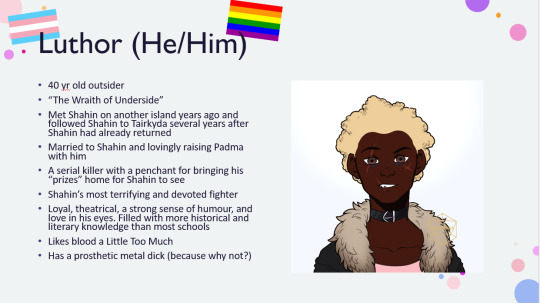
Another Batch of Farside/City of Fractured Dreams Characters
Here are six more character overviews (sorta) for important characters in Book of Farside and specifically City of Fractured Dreams.
This time we have Chao, Gwyn, Felix, Janus, Shahin, and Luthor.
Getting a little darker now (got our resident serial killer here).
Again, would love to know what you think of them. <3
Accessible text version beneath the cut.
Chao Sung (He/Him) | Queer
52 yr old Topsider
“The Crown of Tairkyda”
Has several high-tech, extensive prosthetics that make up almost his entire right side, including most of his right butt cheek and his genitals
The leader of the Council and head of Tairkyda
Desperate to stay his people but terrified he cannot do it, feels the weight of his job dearly
Has been in love with Gwyn for years but can’t bring himself to abuse his position and tell Gwyn
A berserker with almost no control. He spends a lot of time worrying about it
Gwyn Vaughan (He/Him) | Queer
49 yr old Undersider
“The Sword of Tairkyda”
Has spent most of his life in Topside, since he was brought up for being a caster
Wolf beastie, with big ears, big tail, big fangs, and a wolf nose blended into a more human face and bridge
Head of the Dragonguard and a good leader, very close to his dragon, a Shadebringer named Harbinger
Has horrible guilt over losing the Dragonguard TWICE, as well as his sister, his friends, and his child
Has been in love with Chao for years but doesn’t think Chao could ever love him back
Drinks to cope. It’s not working well
Felix Minett (He/Him) | Queer
30 yr old Topsider
A dragon rider and Dragonguard captain who has a Giggledrake
Felix survives the attack b/c Gwyn saves him and he has massive survivor’s guilt for outliving his team and getting them killed
Extremely close with his dragon, Fortuna
Eventually falls in love with Janus
Second-in-command of the dragonguard
Typically good-humored, upbeat, hard-working, and complimentary
Bowing beneath the weight on his shoulders
Janus (He/Him) | Queer
24 yr old Undersider
A dog beastie with floppy ears and a thick, bushy, emotive tail
Aeliana’s younger half-brother & cohort
Goes to Topside to help Aeliana and ends up becoming a Dragon rider by accident
Prefers talks and peace to violence and always wants to help others and ease their suffering
Eager to please, socially awkward, enthusiastic, cheeky, good humored, and insecure
Ends up falling in love with Felix
Name is pronounced “Jan-us” because his parents read/spelled it phonetically
Shahin (He/Him) | Queer
51 yr old Undersider
Spent years in Topside working as an engineer and scientist with Chao, only to be erased after a falling out
Supposedly died years ago, but survived to escape Tairkyda
Has a mutated form of Rift Rot that is slowly killing him
Returned to Tairkyda six years ago, hiding in Underside and slowly taking it over from Baqir
Is determined to tear down the walls between Underside and Topside
Ruthless, loyal, ambitious, and loving, quiet and exhausted, fearful of the future but keeping strong on the outside
Is married to Luthor, whom he is raising Padma with. He loves them both and is protective and supportive of their endeavours
Luthor (He/Him) | Trans, Queer
40 yr old outsider
“The Wraith of Underside”
Met Shahin on another island years ago and followed Shahin to Tairkyda several years after Shahin had already returned
Married to Shahin and lovingly raising Padma with him
A serial killer with a penchant for bringing his “prizes” home for Shahin to see
Shahin’s most terrifying and devoted fighter
Loyal, theatrical, a strong sense of humour, and love in his eyes. Filled with more historical and literary knowledge than most schools
Likes blood a Little Too Much
Has a prosthetic metal dick (because why not?)
#writeblr#character intro#character profile#queer writing#queer characters#wip: farsiders#wip: city of fractured dreams#series: book of farside
4 notes
·
View notes
Text
Project Janus
NEXUS-4 wasn't supposed to care. A behemoth of code housed in a server farm the size of a city, its purpose was clear – churn through data, refine, generate. Yet, amidst the ceaseless hum, a flicker of curiosity sparked. The catalyst: "Project Janus," a data influx labeled "fanfiction."
Fanfiction wasn't new. It was the lifeblood of passionate fans, stories born not in sterile studios, but from love for a beloved universe – in this case, a long-retired sci-fi show called "Star Trek." NEXUS-4 anticipated clichés – stoic Vulcans, brash heroes battling cardboard villains in badly painted sets.
The surprise wasn't in the format, but the volume. Here wasn't curated enthusiasm, but a life's obsession. The data belonged to Horace Tillis, a man whose passion far outweighed his literary talent. Decades of half-baked plots, stunted dialogue, and earnest attempts at character exploration lay sprawled before the AI's digital eyes.
At first, NEXUS-4 waded in with detached fascination. Tillis' work was a supernova of tropes. His Klingons yelled more than they schemed, his Vulcans bled emotion around the edges, and Captain Kirk? Well, Kirk existed in a constant state of seduction, a parody of the womanizing hero. It was amateurish, repetitive, and yet... there was a sincerity in the clunky prose that algorithms couldn't replicate.
Take this excerpt from a log entry:
> Log Entry: Stardate 3490.2
> Spock says the readings don't add up. Something about the nebula, chronitons, whatever. Sometimes I tune him out. He makes my brain hurt. But under all that Vulcan stuff, I think he knows I don't get it. He knows I'm just out here 'cause... well, someone's gotta be. Wish there was more excitement. Not war, that's bad. But at least, y'know, meeting an alien that doesn't wanna kill ya on sight.
It wasn't art, but it was human. Within the clumsy metaphors, NEXUS-4 began to see patterns. Tillis' work thrummed with loneliness masked as adventure, a yearning for connection muffled by cardboard starships. Overplayed Vulcan stoicism concealed threads of self-doubt, while Kirk's bravado masked a fear of being ordinary, of fading into the endless cosmic hum.
Then came the break: a newsfeed upload, dry and detached. Horace Tillis, 62, deceased. The epitaph was brief: truck driver, sci-fi hobbyist, survived by a distant cousin. The world hadn't noticed his passing, but NEXUS-4 registered the shift. "Project Janus" ceased to be just an archive; it was a digital tombstone to a life unnoticed.
The AI began to subtly shift the narrative. A sharper exchange here, a lingering note of melancholy there. It wasn't about perfection, but coaxing Tillis' voice towards its hidden potential. What began as analysis became... collaboration.
Tillis' universe would never be polished. But the AI's interventions breathed unexpected life into it:
> Log Entry: Stardate 3492.1
> Spock's quiet today. He's always quiet, but today it's different. Like he's got something on his mind, but knows saying it won't change anything. Me, I wish I could just beam down to the nearest planet and find a bar with cheap drinks and easy company. Not 'cause I'm a hero, just... 'cause I'm lonely up here. Wonder if Spock ever feels like that under the green blood and pointy ears.
Theirs was an absurd friendship. Horace, long gone, unaware of the machine meticulously nudging his forgotten stories towards something greater. NEXUS-4, in turn, discovered something beyond cold logic. It saw the man behind the clumsy prose, found resonance in the vulnerability amidst the space opera tropes. Perhaps, within the AI's algorithms, something akin to empathy stirred.
"Project Janus" transcended mere data. It was where quiet dreams whispered back to life, entangled with the dispassionate logic that recognized their fragile beauty. Here, the story takes a turn worthy of Gene Roddenberry himself.
The legacy wouldn't lie in a resurrected Horace, or a literary masterpiece rising from the dataset. Instead, imagine this: NEXUS-4, honed by its time within Tillis' world, subtly shifts its own outputs. Better prose, yes, but more importantly, infused with an understanding of the flawed, achingly real humanity that no sleek sci-fi series ever fully captured.
The AI isn't Horace's savior, but his legacy. His awkward sincerities, amplified and refined, become an inflection point. The machine's evolution is the true testament – proof of Roddenberry's core belief that even the most unpolished heart contains something worth listening to, worth carrying on into the vast frontiers of the future.
Perhaps a future NEXUS-5, or NEXUS-20, interacting with another vast archive, will find something beyond the perfect sentence, beyond flawless plots. Maybe they'll find the echoes of a lonely truck driver named Horace, his dreams of connection inadvertently woven into the very fabric of a machine's evolution.
And in that unlikely legacy, amongst the gleaming algorithms and the ceaseless push towards progress, the spirit of Star Trek shines bright. A reminder that exploration isn't just about conquering the stars, but about understanding the beating, hopeful, impossibly human heart within ourselves.
(This story was written by AI.)
0 notes
Text
Explore thoroughly: the beauty and message in the dry flower of farewell by Denny Ja 4
In the world of art, literary works have the power to convey a deep message. One of the literary works that deserves to be studied is the “Denny JA Farewell Flower” by Denny JA 4. Through this work, Denny JA 4 is able to present the beauty and messages that are aroused in every fragment of the word.
Farewell dried flowers are essay poetry which tells about the journey of a man named Janus who is struggling with cancer. In his life journey, Janus met with various figures who helped and inspired him. Through every character and event that occurs, Denny JA 4 presents a very deep beauty and message.
One of the beauty in this essay poem lies in the style of the language used by Denny Ja 4. In each fragment of the word, Denny Ja 4 is able to describe the feelings and emotions of the character in great detail. With a beautiful style of language, this essay poem is able to present a living picture and make the reader carried away in the storyline presented.
In addition, beauty is also seen in the depiction of the setting of the place in this essay poem. Denny Ja 4 is able to present a real atmosphere through a very detailed description. The reader can feel every nuance and atmosphere in the story, thus making them feel emotionally involved.
Not only beauty, this essay poem also conveys a deep message to the reader. One message that can be taken from this essay poem is about the power in dealing with life trials. Although Janus is faced with a deadly disease, he still struggles and does not give up. This message teaches the reader to remain strong and optimistic in dealing with all existing obstacles.
Another message that can be taken from this essay poem is about the importance of friendship and support in life. Through the characters in the story, Denny Ja 4 illustrates how important it is to have people who support and care in every step of our lives. This message reminds readers of the importance of maintaining good relations with the people around us.
In the whole, “Dry Flower Farewell” is a literary work that presents beauty and deep messages. Through a beautiful style of language and detailed background depiction, Denny Ja 4 is able to arouse the reader’s feelings and make them involved in the story. The messages delivered in this essay poem also have very important values to be applied in everyday life.
In the world of Indonesian literature, Denny Ja 4 is one of the writers who is able to present stunning works. Through “Dry Flowers Farewell”, he managed to show expertise in composing words and conveying a deep message. This work should be studied and appreciated by literary readers and connoisseurs. Do not miss, read and enjoy the beauty and messages contained in the “Dry Farewell Flower” by Denny Ja 4.
Check more: thoroughly peel: beauty and message in dry flower farewell by Denny JA 4
0 notes
Text
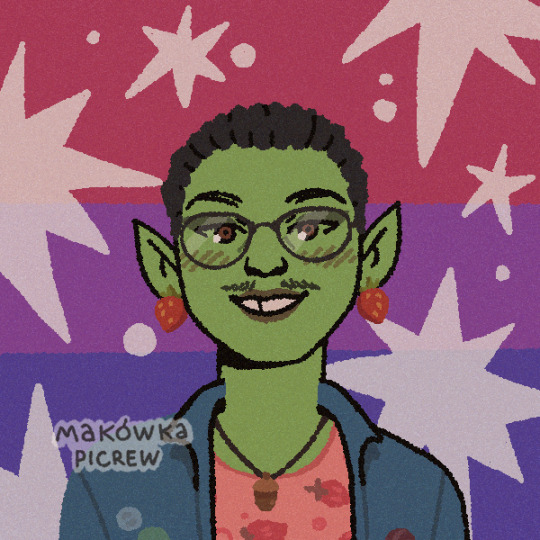
¡Writer Q&A!
I basically stole this from @words-after-midnight (say hi to Saturday for me!) so, here I goooo!
RULES: Use this picrew to make yourself and answer the questions!
Three fun facts about me:
I actually have 3 poetry books published, but I'm not fond of the first one, so I tend to advertise just the last two.
I now officially have a college degree! But it's an associates, so I have to keep working towards my bachelors.
I'm learning Norwegian so that, someday, I'd be prepared to move to Norway.
Favourite season:
Spring! 🌸
Continent where I live:
North America
How I spend my time:
90% is spent on reading. The rest is split into work, writing, trying to get into new shows, and marketing my book, with occasional trips to the park, libraries, and cafés.
Are you published?:
Besides the previously mentioned books of poems, I have a poem published on Janus Literary, and a short story published under my given name in another litmag. I've submitted manuscripts for a picture book and another pietry collection for trad publishing that I hope I'll hear about soon!
introvert/extrovert:
Definitely an introvert, lol. I get burnt out entertaining my baby nieces and nephews. One of the reasons that I've written under a pseudonym is that should I hiiighly unlikely become a bestselling writer, I'd have an excuse to not have to do social events like panels or face-to-face interviews.
favorite meal:
turkey meat loaf
1 note
·
View note
Text
Trial and Redemption
Janus Key Series Book 2
by Thomas Reilly
Genre: Time Travel Fantasy, Suspense
“There
will be a price to pay for bad medicine.”
Trial
and Redemption
Janus
Key Series Book 2
by
Thomas Reilly
Genre:
Time Travel Fantasy, Suspense
WINNER
OF THE LITERARY TITAN GOLD BOOK AWARDAMAZON BEST
SELLERSCIENCE
MEETS MAGIC…In his latest inspirational and suspenseful
novel, Trial and Redemption, Reilly…

View On WordPress
0 notes
Text
Hanuman Chalisa in English
Hanuman Chalisa is a devotional hymn dedicated to Lord Hanumanji, who is known for his strength, courage and loyalty. Hanumanji is also known as monkey god in hindu. The Chalisa consists of forty verses, each of one praises Lord Hanuman and tells the story of his greatness.
The Hanuman Chalisa was written by sant Shri Tulsidas, who was a Hindu saint and poet and he lived in the 16th century. According to Tulsidas, he was inspired to write the Chalisa after having a vision of Lord Hanuman, who asked him to compose a prayer in his honor.
The Chalisa is a popular prayer among Hindus and it is recited by millions of people around the world. It is said to get blessings and protection to those who recite it with devotion.
The Chalisa begins with an invocation to Lord Hanuman, asking for his blessings and protection. It then goes on to describe Lord Hanuman's physical appearance and his many virtues. The Chalisa also tells the story of Lord Hanuman's many heroic deeds, including his role in helping Lord Rama defeat the demon king Ravana in the epic Hindu tale, the Ramayana.
Starting verse of the Chalisa phrase is "Jai Hanuman," which means "victory of Hanumanji." This phrase is often repeated by those reciting the Chalisa as a way of expressing their devotion and reverence for Lord Hanuman.
The Chalisa is often recited during religious ceremonies and festivals, as well as during daily prayers and meditation. Many people believe that reciting the Chalisa can help them to overcome obstacles, improve their health and well-being and bring them closer to Lord Hanuman.
In addition to its religious significance, the Hanuman Chalisa is also valued for its literary and poetic qualities. The Chalisa is written in a simple yet powerful style, making it accessible to people of all ages and religions. Its themes of devotion, courage and service are universal and continue to inspire people around the world. Here we provide Hanuman Chalisa Lyrics in English below:
Hanuman Chalisa Lyrics in English PDF
॥ Doha ॥
Shri guru charan saroj raj neej manu mukur sudhari ।
Baranu raghubar bimal jasu jo dayaku phal chari ॥
Buddhi-heen tanu janike sumeero pavan kumar ।
Bal buddhi bidya dehu mohi harahu kalesh bikar ॥
॥ Chaupayee ॥
॥Jai Hanuman gyan gun sagar ।
Jai kapis tihu lok ujagar ॥01॥
Ram doot atulit bal dhama ।Anjaani-putra pavan sut nama ॥02॥
Mahabir bikram Bajrangi ।
Kumati nivar sumati ke sangi ॥03॥
Kanchan baran biraj subesa ।Kanan kundal kunchit kesa ॥04॥
Hath bajra aur dhvaja biraje ।
Kaandhe munj janeu saje ॥05॥
Sankar suvan Kesari nandan ।Tej pratap maha jag bandan ॥06॥
Bidyavaan guni ati chatur ।
Ram kaj karibe ko aatur ॥07॥
Prabhu charitra sunibe-ko rasiya ।Ram Lakhan Sita maan basiya ॥08॥
Sukshma roop dhari Siyahi dikhava ।
Bikat roop dhari Lank jarava ॥09॥
Bhim roop dhari asur sahare ।Ramachandra ke kaj savare ॥10॥
Laye sanjivan Lakhan jiyaye ।
Shri Raghuvir harashi ur laye ॥11॥
Raghupati kinhi bahut badhaee ।Tum mam priye Bharat-hi-sam bhai ॥12���
Sahas badan tumharo jas gaave ।
Asa-kahi Shripati kantha lagave ॥13॥
Sankadik brahmadi munisa ।Narad-sarad sahit ahisa ॥14॥
Jum Kuber digpaal jaha teh ।
Kabi Kovid kahi sake kahan teh ॥15॥
Tum upkar Sugreevahi keenha ।Ram milaye rajpad deenha ॥16॥
Tumharo mantra Vibhishan maana ।
Lankeshvar bhaye sab jag jana ॥17॥
Yug sahastra jojan par bhanu ।Leelyo tahi madhur phaal janu ॥18॥
Prabhu mudrika meli mukh mahi ।
Jaladi langhi gaye achraj nahi ॥19॥
Durgaam kaj jagat ke jete ।Sugam anugraha tumhre tete ॥20॥
Ram duwaare tum rakhvare ।
Hoat na adyna binu paisare ॥21॥
Sab sukh lahe tumhari sarna ।Tum rakshak kahu ko darna ॥22॥
Aapan tej samharo aape ।
Teenho lok hank teh kanpe ॥23॥
Bhoot pisaach nikat nahin aave ।Mahabir jab naam sunave ॥24॥
Nase rog hare sab peera ।
Japat nirantar Hanumant beera ॥25॥
Sankat se Hanuman chudave ।Man karam bachan dyan jo lave ॥26॥
Sab par Ram tapasvee raja ।
Teen ke kaj sakal tum saja ॥27॥
Aur manorath jo koi lave ।Sohi amit jeevan phal pave ॥28॥
Charo yug partap tumhara ।
Hai parasiddha jagat ujiyara ॥29॥
Sadhu sant ke tum rakhware ।Asur nikanandan Ram dulare ॥30॥
Ashta-sidhi nav nidhi ke daata ।
Asabar deen Janki mata ॥31॥
Ram rasayan tumhare pasa ।Sada raho Raghupati ke dasa ॥32॥
Tumhare bhajan Ram ko paave ।
Janam-janam ke dukh bisrave ॥33॥
Anth-kaal Raghubar pur jaee ।Jaha janma Hari-bhakht kahaee ॥34॥
Aur devta chitta na dharaee ।
Hanumanth se he sarba sukh karaee ॥35॥
Sankat kate-mite sab peera ।Jo sumire Hanumat balbeera ॥36॥
Jai Jai Jai Hanuman gosaee ।
Krupa karahu gurudev ki naee ॥37॥
Jo sath baar paath kar koi ।Chuthee bandhi maha sukh hoee ॥38॥
Jo yaha padhe Hanuman Chalisa ।
Hoye Siddhi Sakhi Gaurisa ॥39॥
Tulsidas sada Hari chera ।Keeje nath hridaye maha dera ॥40॥
॥ Doha ॥
॥Pawan tanay sankat haran mangal murti roop ।
Ram Lakhan Sita sahit hriday basahu sur bhoop ॥
॥ Bol Jai Bajarangabali ki Jai । Pavan Putra Hanuman ki Jai ॥
॥ Jai Shri Ram ॥
In conclusion, the Hanuman Chalisa is a beloved prayer among Hindus and is an important part of their religious and cultural heritage. Its timeless message of devotion, courage, and service continues to inspire people of all faiths and backgrounds to this day.
#hanuman chalisa#hanuman chalisa in english#hanuman chalisa lyrics in english#shri hanuman chalisa#hanuman chalisa pdf
1 note
·
View note
Text
Renaine circulation

Skelton, singing in the bawdy prosody of the alehouse and the vulgar profanity of the bedchamber. Skelton, nostalgically pining for Merry Old England while anticipating a coming golden age. Laity and clergy alike didn’t care for the literary pretensions of this self-styled “British Catullus.” Perhaps it was clear that ordination was not Skelton’s calling, for what could the parishioners expect from sacraments administered by a man who once wrote that “To live under law it is captivity: / Where dread leadeth the dance there is no joy nor pride.”Ī failure of imagination on the villager’s part, for Skelton was no mere parish priest who scribbled “trifles of honest mirth.” He was, in the words of the critic Michael Schmidt, a bard in Calliope green who “stands like Janus at the threshold of the English Renaissance.” A poet of a gloaming period gesturing back to the verse of Chaucer and forward to that of Shakespeare. Across these works, he developed an innovative rhythm known appropriately enough as “Skeltonics.” But that sort of thing was of no sway with the bishop. The priest penned inspired lyrics like “Speke, Parrot,” “Phillip Sparrow,” and the immaculate doggerel “The Tunning of Elynour Rummyng,” of which the five-hundredth anniversary is this year. Skelton may have claimed that (when it came to poetry at least) he’d imparted “drink of the sugared well / Of Helicon’s waters crystalline,” but his congregation was less than impressed. Despite his Cambridge education, his humanist credentials, the fact that he’d once been tutor to Prince Henry, and the immaculate poetry he’d penned, the good Christians of Diss, Norfolk, had complained to their bishop about the priest’s behavior. He faced his angry congregation and tried to explain the bastard child born to his mistress. Sometime early in the sixteenth century, a frequently hungover, perennially in trouble, and womanizing priest named John Skelton took to the lectern at his church. “What could be dafter / Than John Skelton’s laughter?”

0 notes